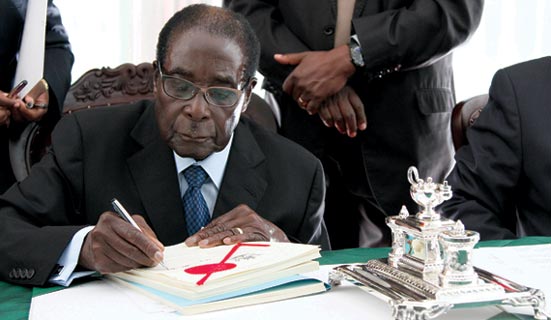
THE purpose of this article is to examine the conceptual and normative value of a Declaration of Rights and, more specifically, what it means for Zimbabwe.
Having an expanded Declaration of Rights is an important step towards creating a culture of constitutionalism in the country.
A Declaration of Rights is important as a symbol of the values that a country stands for. Principles of human rights are a key “countervailing force to the exercise of totalitarian, bureaucratic and institutional power — widely identified as the greatest threats to the liberty of the individual and democratic freedoms”. (Sir Anthony Mason, A Bill of Rights for Australia — Australia Bar Review (1989) 79 at 79-80))
These principles are entrenched in constitutions around the world to provide citizens with protection from unwarranted interference from the State and to offer a legal basis upon which to challenge government action that violate them. A Declaration of Rights is particularly important to protect the rights of religious, ethnic, linguistic and other minorities, whose interests can be easily ignored by the numerical majority and overruled by democratically elected governments.
The origin of the concept of a Declaration of Rights The idea of a Declaration of Rights descends from a long tradition of philosophy, espoused by theorists such as John Locke and Thomas Jefferson, which focused on the idea of individual rights that are safeguarded by and against the government. This conception of human rights was enshrined in the 1789 French Declaration of the Rights of Man and the Citizen and the American Bill of Rights.
The contemporary framework for human rights discourse was initiated following World War II with the inception of the 1948 Universal Declaration of Human Rights (UDHR).
This perspective on human rights is more egalitarian, less individualistic and has an international focus. It places additional emphasis on protection from discrimination, focuses on the right of every individual to equality before the law and introduces socioeconomic rights, which attempt to reduce inequality and remedy unequal access to services.
It is less individualistic because it looks beyond the individual, who is the primary repository of rights under classical theories of human rights, to provide for some group rights.
- Chamisa under fire over US$120K donation
- Mavhunga puts DeMbare into Chibuku quarterfinals
- Pension funds bet on Cabora Bassa oilfields
- Councils defy govt fire tender directive
Keep Reading
The contemporary conception of human rights also places the family at the forefront as the foundational unit of society. Finally, contemporary Declaration of Rights are more international because they draw on the language and principles of the many international and regional human rights conventions and treaties established after the UDHR. Indeed, the Constitution of Zimbabwe 2013 incorporates the country’s international obligations directly into domestic law through a mechanism of domestication which is enshrined in the Constitution. International standards, as codified in treaties and other instruments, therefore, play critical roles in the creation and evolution of national Declaration of Rights and human rights legislation.
By having a Declaration of Rights, Zimbabwe has accepted the idea of international human rights as universally applicable and relevant to Zimbabwean society. However, the ability of the Executive, Legislature and Judiciary to effect change depends somewhat on the perceived relevance of the Declaration of Rights to Zimbabwean society. State organs will only be willing to provide a robust interpretation and application of the Declaration of Rights, and stakeholders will only be willing to observe the Bill of Rights and its associated jurisprudence, if they perceive the Bill of Rights as legitimate and a reflection of values widely held in society.
It is, therefore, important for stakeholders to continue to provide public education on the Constitution to ensure that the general population has a basic understanding of what the Declaration of Rights is and why it is beneficial to them.
A Declaration of Rights can be an important element in the movement towards creating a culture of constitutionalism.
Constitutionalism “enshrines respect for human worth and dignity as its central principle, fostering conditions for political participation and legitimating substantive restraints on governmental power, even in cases where government action purportedly mirrors the popular will.” (Mac Darrow and Philip Alston, Bills of Rights in Comparative Perspective)
A codified Declaration of Rights can help to foster a “culture of liberty” by serving as a powerful symbol of democratic renewal and a new era of government accountability, more so than if a country relies on human rights legislation or case law. In South Africa, for example, the introduction of its new Constitution with its entrenched Bill of Rights in 1996 marked the decisive moment when the State left the era of Apartheid and moved forward under new political leadership.
Actualising rights It is generally accepted that a democratic government that is constrained by strong institutions and a constitution will be less likely to commit human rights abuses against its citizens.
Constitutions that provide effective safeguards to curtail government excesses and create democratic space for citizens can play an important role in the protection of human rights both domestically and internationally (Okoth-Ogendo, Constitutions Without Constitutionalism: Reflections on an African Political Paradox in Greenburg).
Yet the enactment of a Declaration of Rights does not necessarily mean that a government has a theoretical, let alone practical, commitment to constitutionalism. Separation of powers and rule of law must guide the exercise of government power; thus the executive, legislature, judiciary and related institutions must be committed to governance by established laws.
Without independent and effective institutions of governance to implement the Declaration of Rights it is impossible to entrench or enforce the protections that are included therein (Constitutionalism and Democracy: Transitions in the Contemporary World 1993) 65-82 at 80). Given the interplay between the Constitution and the institutions that oversee its enforcement, it is extremely difficult to establish a causal link between the enactment of a Declaration of Rights and the reduction of human rights violations.
Therefore, the process of implementation of the Constitution of Zimbabwe needs to enhance perceptions of inclusion if it is to facilitate real transition to democracy, peace and respect for human rights.
Through fulfilling its duty to observe, respect, protect, promote and fulfil the rights and fundamental freedoms in the Declaration of Rights, the State has the opportunity to ensure that every Zimbabwean feels equally protected by the Constitution, which is necessary to facilitate meaningful movement towards a just and equal society.
Mukwewa is a member of Abameli Human Rights Lawyers Network










